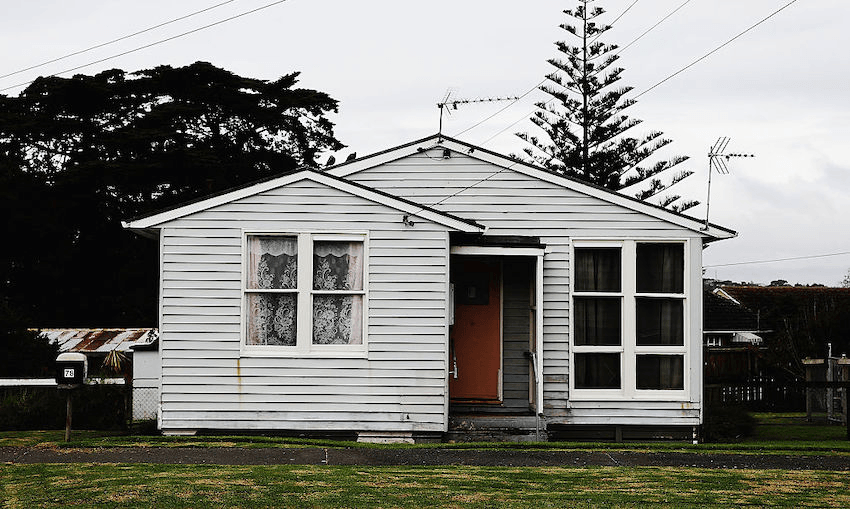Laura O’Connell Rapira looks at what benefit cuts and successive generations of an unregulated housing market has done to welfare and housing for those in the margins.
For the first seven or so years of my life, I was raised mostly by my mum on the domestic purposes benefit (my dad is a big part of my life, but my parents’ romantic relationship wasn’t meant to be beyond creating me).
I was three years old when the then-National government passed the ‘Mother of all Budgets’. The finance minister at the time, Ruth Richardson, believed jobs would miraculously appear for people if she cut their income support, so she ruthlessly slashed the unemployment benefit by $14 a week, the families benefit by $25 and the sickness benefit by $27 (about $60 in today’s currency). Benefits basically stayed at those rates until 2016, when they were marginally increased by then finance minister Bill English.
It’s a strange ideology that believes cutting support to sick people, solo parents and working-class families helps them live happy and healthy lives, but it’s an ideology that’s pervaded government policy ever since.
Overnight, and with the stroke of a pen, Ruth Richardson trapped tens of thousands of people in a poverty whose harms continue today. My mum and I lived with my grandad and aunty in Māngere when that budget was passed in 1991. There were a lot of families in our neighbourhood who relied on income support at that time. In South Auckland in the 1980s, adult unemployment was 40-50%.
The community was still feeling the impacts of Robert Muldoon’s racist dawn raids and the previous Labour government’s terrible economic reforms had started to wear folks down. A stock market crash in 1987 meant that one in three manufacturing jobs were lost and freezing works and factories were shut down. The only reason my mum and I got by was because we had whānau support, but not everyone is that lucky.
The 1980s marked the beginning of a long period of low wages, eroded benefits, rising food prices and high housing costs. For my entire life, people in government have under-invested in key services that help the lowest-income families, like public housing and income support. Instead, successive governments have prioritised policies that help people who are already well-off, property speculators the obvious example.
A recent Herald investigation found that the hands-off approach to housing of successive governments has resulted in property speculators making an average of $70,000 a sale, sometimes without doing any upgrades.
Meanwhile, most families in poverty have housing costs that take up over half of their income. Seventy-four per cent of families in poverty put off a trip to the dentist, while 77% can’t afford an unexpected $500 expense.
I remember the difficulties my mum faced trying to buy us a dehumidifier for our mouldy and damp West Auckland home. I remember when her card declined and the shop worker announced it loudly to embarrass her, probably because she was Māori, a woman and poor.
This is the reality for families trying to scrape by on low incomes in an era of high housing and food costs. Too many parents are under-resourced and overstressed. So while I think this government’s announcement of kids’ school lunches is a good start, it is simply not enough.
As long as we are willing to keep parents trapped in poverty, there will continue to be kids in poverty too.
For the past two elections, New Zealanders have consistently ranked “child poverty” as one of their number one concerns, but our tendency has been toward supporting solutions that only solve one part of the problem. We buy Eat My Lunch but we distrust the idea of just giving people enough money to live on, despite all the evidence that says it would be the most effective way to fix poverty.
Thirty years of regressive government policy that has pushed more people into poverty, coupled with opportunistic politicians’ lazy beneficiary bashing, means that we tend to let those living at the margins take the blame for government’s failure to invest in public services and incomes again and again. It’s outrageous to me that people in government would rather spend millions of taxpayer dollars chasing down the $30 million we lose to so-called “welfare fraud” (I’d call it survival) than the (at least) $1.2 billion lost to wealthy tax dodgers each year.
As New Zealanders, we believe in justice and compassion. We want everyone to have the opportunity to thrive. By providing good income support that gives real options in life the government can make it possible for everyone to do well. Strengthening benefits, as called for by the government’s own Welfare Expert Advisory Group, would help more people escape the restraints of poverty. It would release the pressure on families and children and help more people to unlock life’s rich opportunities.
After 30 years of fully funding failure, it is the least they could do.
